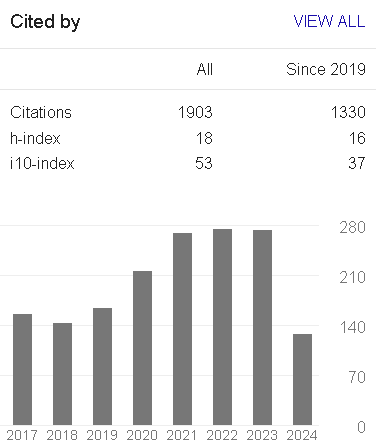An Optimal Framework for Preserving Location Privacy in Geosocial Networks
Keywords:
geosocial networks, security, privacy, secure computing, location based serviceAbstract
Analysing the conflict of privacy in geo social networks, steps are taken towards addressing the conflict. A novel approach is proposed to define the location and user based safety metrics. Secret Key cryptography is used for private information retrieval that allows a user to retrieve information. The approach is based on the construction of the framework which relies on the concept of LCPs, the profiles which are built from the profiles of users that have visited a certain location and DCPs a set of co-located users. The key insight is to apply secure user-specific, distance-preserving coordinate transformations to all location data shared with the server. An Encryption technique, AES is further applied to enhance the security such that a technique which the users are allowed to communicate from a database server without revealing what is actually being retrieved from the server. This allows all location queries to be evaluated correctly by the server, but our privacy mechanisms guarantee that servers are unable to infer the actual location data from the transformed data.
References
Bogdan Carbunar, Mahmudur Rahman, Jaime Ballesteros, Naphtali Rishe, and Athanasios V. Vasilakos,” PROFILR: Toward Preserving Privacy and Functionality in Geosocial Networks” IEEE Transactions on Information Forensics and Security, Vol. 9, No. 4, April 2014
Krishnamoorthy.B, Y.Ginjali and C.E.Wills “On the Leakage of Personally Identifiable Information via Geosocial Networks” Comput.Comn Rev Vol 40 No 1pp 112-117, 2010
Josh Benaloh. Dense probabilistic encryption. InProceedings of the Workshop on Selected Areas of Cryptography, pages 120–128, 2009.
Dario Freni1, Carmen Ruiz Vicente, Sergio Mascetti, Claudio Bettini, Christian S. Jensen,”Preserving Location and Absence Privacy in Geo-Social Networks”, CIKM’10, October 26–302010, Toronto, Ontario, Canada.
B.Carbunar, M.Rahman, J.Ballestros, N.Rishe “Towards Safe Cities a Mobile and Social Networking Approach”-IEEE Trans Parallel Distributed Systems Vol3 Pp1-14 Nov2013
B.Carbunar, M.Rahman, J, N.Rishe “Eat the Cake And Have It Too: Towards Privacy Preserving Location Aggregate Functionalites in Social Networking Approach”-IntConf Mob Sec Approach 2013 Pp1-3
Tootoonchian.A, S.SaroiouY.Ginjali and A.Wolman “Lockr-the Better Privacy for Social Networks”ieee- 2009 PP 1-12
F.G.Olumofin, P.Tysowski, I.Goldberg, and U.Hengartner, “Achieving efficient query privacy for location based services,” in Proc.Privacy Enhancing Tech., 2010, pp93–110.
B.Carbunar, M.Rahman, J.Ballestros,”Private Location Centric Profiles for GeoSocial Networks” ”Inproc.19th Newyork, USA
Bogdan Carbunar, Radu Sion, Rahul Potharaju, and Moussa Ehsan. The shy mayor: Private badges in geosocial networks. In Proceedings of the 10th International Conference Applied Cryptography and Network security (ACNS), pages 436–454, 2012
Amirreza Masoumzadeh, James Joshi, “Top Location Anonymization for Geosocial Network Datasets” TRANSACTIONS ON DATA PRIVACY 6 (2013) 107–126
K.P.N. Puttaswamy and B.Y.Zhao, “Preserving privacy in location based mobile social applications,”in Proc. Mobile Comput. Syst. Appl., New York, USA, 2010, pp. 1–6.
B.Carbunar, M.Rahman, J.Ballestros, N.Rishe “Towards Privacy Preserving Functionalities in Social Networking Approach”-intConf Mob Sec Approach 2013 Pp1-3
A. M. Kakhki, C. Kliman-Silver, and A. Mislove,“Iolaus: Securing online content rating systems,” in Proc. 22nd Int. World Wide Web Conf.(WWW), Riode Janeiro, May 2013, pp. 1–5.
G. Coley, Beagleboard System Reference Manual. Dallas, TX, USA, BeagleBoard. Org., Dec. 2009.
B. Carbunar and R. Potharaju, “You unlocked the Mt. Everest badge on foursquare! countering location fraud in geosocial networks,” in Proc. 9th IEEE Int. Conf. Mobile Ad Hoc Sensor Syst. (MASS), Feb. 2012, pp. 182–190.
S. Goldwasser and S. Micali, “Probabilistic encryption & how to play mental poker keeping secret all partial information,” in Proc. 14th Annu.ACM Symp. Theory Comput., New York, NY, USA, 1982, pp.365–377.
D. L. Chaum, “Untraceable electronic mail, return addresses, and digital pseudonyms,” Commun. ACM, vol. 24, no. 2, pp. 84–90, 1981.
Downloads
Published
How to Cite
Issue
Section
License
Copyright (c) 2015 COMPUSOFT: An International Journal of Advanced Computer Technology

This work is licensed under a Creative Commons Attribution 4.0 International License.
©2023. COMPUSOFT: AN INTERNATIONAL OF ADVANCED COMPUTER TECHNOLOGY by COMPUSOFT PUBLICATION is licensed under a Creative Commons Attribution 4.0 International License. Based on a work at COMPUSOFT: AN INTERNATIONAL OF ADVANCED COMPUTER TECHNOLOGY. Permissions beyond the scope of this license may be available at Creative Commons Attribution 4.0 International Public License.


